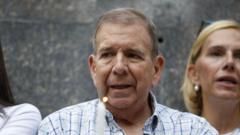This website uses cookies so that we can provide you with the best user experience possible. Cookie information is stored in your browser and performs functions such as recognising you when you return to our website and helping our team to understand which sections of the website you find most interesting and useful.


Venezuelan opposition candidate Edmundo González has vowed to "continue to fight" for democracy in his own country, after being granted asylum in Spain.
Mr González left Venezuela, after having spent weeks in hiding, arriving at the Torrejón military air base in Madrid with his wife at about 16:00 local time on Sunday (14:00 GMT).
The departure of the 75-year-old from the country followed turmoil in the wake of the 28 July elections, in which President Nicolás Maduro claimed victory - something which was disputed by Mr González, and many sections of the international community.
In an audio message distributed by his press team, he said he was "confident that soon we will continue the fight to achieve freedom and the recovery of democracy in Venezuela".
Prior to his departure, an arrest warrant had been issued in Venezuela, with the government accusing him of conspiracy and of forging documents, among other "serious crimes".
Thanking his supporters for expressions of solidarity and confirming his arrival in Spain, Mr González said: "My departure from Caracas was surrounded by episodes of pressure, coercion and threats that I wouldn’t be allowed to leave."
Earlier, the country's opposition leader María Corina Machado wrote on social media that he had made the decision to leave the country because "his life was in danger", citing a "brutal wave of repression" in the election aftermath.
Ms Machado, a popular candidate in the country, had been expected to run as the candidate against Mr Maduro, but was prevented from doing so at the last minute by institutions loyal to the president.
The opposition said it had evidence Mr González had won by a comfortable margin, and uploaded detailed voting tallies to the internet which suggest Mr González beat Mr Maduro convincingly.
The US, the EU and the majority of foreign governments have refused to accept Mr Maduro as the winner without Caracas releasing detailed voting data to prove the result.
In a statement on Sunday, US Secretary of State Antony Blinken said Mr González's departure from Venezuela "is the direct result of the anti-democratic measures that Nicolás Maduro has unleashed on the Venezuelan people, including [Edmundo] González Urrutia and other opposition leaders, since the election".
He added: "The election results and the will of the people cannot be merely swept aside by Maduro and the Venezuelan electoral authorities. We stand with González Urrutia in his call to continue the struggle for liberty and the restoration of democracy in Venezuela."
Earlier on Sunday, Vice-President of the European Commission Josep Borrell said: "Today is a sad day for democracy in Venezuela." He added that "in a democracy, no political leader should be forced to seek asylum in another country".
He said Venezuela needed to end its oppression of opposition leaders and free all political prisoners.
Speaking at a socialist party meeting on Saturday, Spanish Prime Minister Pedro Sánchez described Mr González as "a hero who Spain will not abandon".
The country's Foreign Minister José Manuel Albares said Madrid would grant Mr González asylum as it was "committed to the political rights" of all Venezuelans.
Mr González's departure came as security forces in Venezuela surrounded the Argentine embassy in the capital, Caracas, where six opposition figures have been sheltering.
Venezuela's foreign ministry alleged that terrorist acts were being plotted inside.



 Africana55 Radio
Africana55 Radio 
